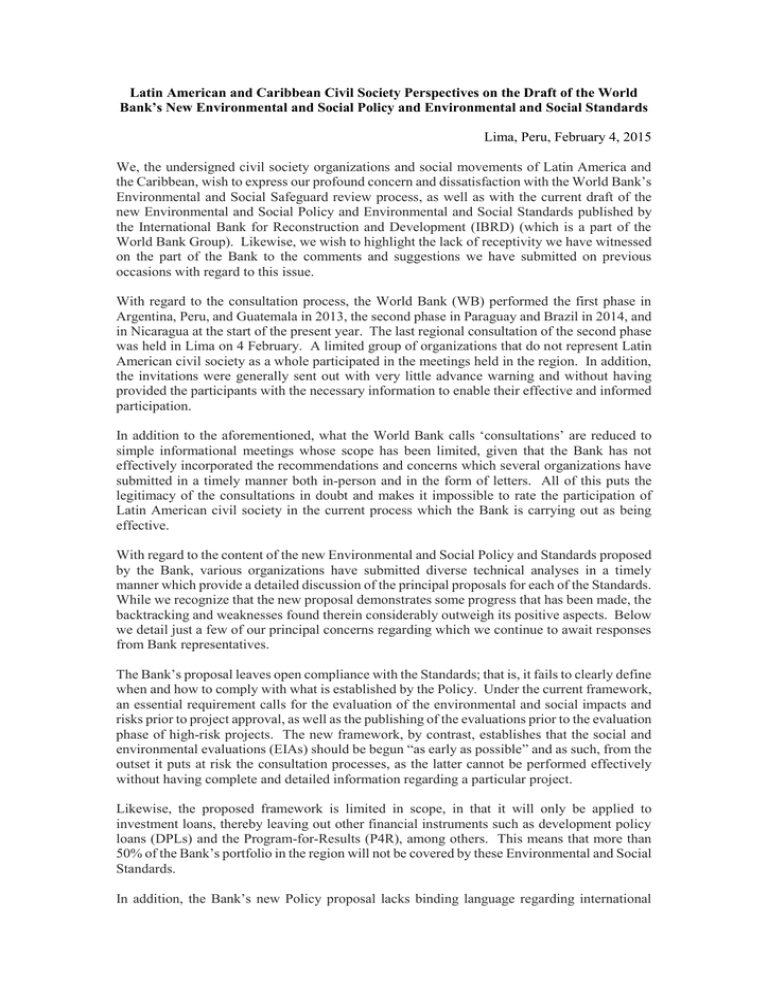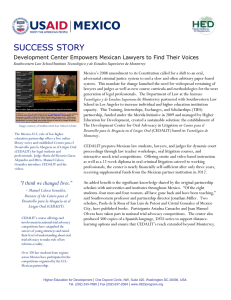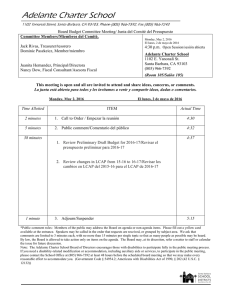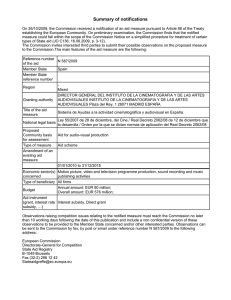Latin American and Caribbean Civil Society Perspectives on the
Anuncio

Latin American and Caribbean Civil Society Perspectives on the Draft of the World Bank’s New Environmental and Social Policy and Environmental and Social Standards Lima, Peru, February 4, 2015 We, the undersigned civil society organizations and social movements of Latin America and the Caribbean, wish to express our profound concern and dissatisfaction with the World Bank’s Environmental and Social Safeguard review process, as well as with the current draft of the new Environmental and Social Policy and Environmental and Social Standards published by the International Bank for Reconstruction and Development (IBRD) (which is a part of the World Bank Group). Likewise, we wish to highlight the lack of receptivity we have witnessed on the part of the Bank to the comments and suggestions we have submitted on previous occasions with regard to this issue. With regard to the consultation process, the World Bank (WB) performed the first phase in Argentina, Peru, and Guatemala in 2013, the second phase in Paraguay and Brazil in 2014, and in Nicaragua at the start of the present year. The last regional consultation of the second phase was held in Lima on 4 February. A limited group of organizations that do not represent Latin American civil society as a whole participated in the meetings held in the region. In addition, the invitations were generally sent out with very little advance warning and without having provided the participants with the necessary information to enable their effective and informed participation. In addition to the aforementioned, what the World Bank calls ‘consultations’ are reduced to simple informational meetings whose scope has been limited, given that the Bank has not effectively incorporated the recommendations and concerns which several organizations have submitted in a timely manner both in-person and in the form of letters. All of this puts the legitimacy of the consultations in doubt and makes it impossible to rate the participation of Latin American civil society in the current process which the Bank is carrying out as being effective. With regard to the content of the new Environmental and Social Policy and Standards proposed by the Bank, various organizations have submitted diverse technical analyses in a timely manner which provide a detailed discussion of the principal proposals for each of the Standards. While we recognize that the new proposal demonstrates some progress that has been made, the backtracking and weaknesses found therein considerably outweigh its positive aspects. Below we detail just a few of our principal concerns regarding which we continue to await responses from Bank representatives. The Bank’s proposal leaves open compliance with the Standards; that is, it fails to clearly define when and how to comply with what is established by the Policy. Under the current framework, an essential requirement calls for the evaluation of the environmental and social impacts and risks prior to project approval, as well as the publishing of the evaluations prior to the evaluation phase of high-risk projects. The new framework, by contrast, establishes that the social and environmental evaluations (EIAs) should be begun “as early as possible” and as such, from the outset it puts at risk the consultation processes, as the latter cannot be performed effectively without having complete and detailed information regarding a particular project. Likewise, the proposed framework is limited in scope, in that it will only be applied to investment loans, thereby leaving out other financial instruments such as development policy loans (DPLs) and the Program-for-Results (P4R), among others. This means that more than 50% of the Bank’s portfolio in the region will not be covered by these Environmental and Social Standards. In addition, the Bank’s new Policy proposal lacks binding language regarding international human rights standards and permits borrower governments to “opt” to comply with the Indigenous Peoples Policy to protect their rights. The foregoing undermines the international consensus regarding the specific fundamental rights of indigenous peoples to their lands, territories, resources, and the course of their own development. The draft eliminates the requirements for reference studies for reporting on the protection of the right to land, sustenance, and adequate housing. In addition, it introduces “biodiversity compensation” in what had previously been considered natural habitats in critical condition and protected areas wherein projects could not be implemented. This is crucial to our region, which contains vast indigenous and tribal territories as well as natural habitats in critical condition. On another front, the Bank’s Policy proposal shifts responsibility for applying the Safeguards to borrower countries, without making clear how and when borrower countries’ systems will be employed, and without establishing precise criteria regarding the situations in which the countries’ systems are unacceptable. The foregoing concerns us, given that many of our countries have weakened their regulatory frameworks, thereby endangering the full guarantee and respect for human rights. For example, a new law in Peru profoundly weakens the authority and capacity of the Organismo de Evaluación y Fiscalización Ambiental [Office of Environmental Evaluation and Auditing] (OEFA), as well as the inter-sectorial coordination and control over the quality of environmental impact evaluations for which the newly created Servicio Nacional de Certificación Ambiental para las Inversiones Sostenibles [National Environmental Certification Service for Sustainable Investments] (SENACE) is responsible. For its part, last year Mexico approved the first package of energy reform regulations prioritizing hydrocarbons, gas, and energy over any other use of the land. These regulations permit expeditious expropriations of land, as well as potentially ignoring natural protected areas. Bolivia’s Mining Law similarly permits activities in protected areas such as national parks, as well as excluding indigenous peoples’ right to free, prior, and informed consent with regard to exploratory activities. Likewise, in recent years environmental permits for extractive and infrastructure projects in Colombia have been weakened. Without the necessary clarifications, the draft leaves the Bank and borrowers with less of a possibility to focus on safeguards that contribute to building local risk-management capacity and respect for human rights. In addition, in labor-related matters we find the Bank’s proposal to be weak in terms of adequate worker protections, given that it only protects those workers who are directly hired by the project and excludes tertiary contractors and public servants who are indirectly in charge of the project; that is, it does not protect fundamental worker rights throughout the supply chain involved in the execution of the project. On another front, freedom of association will only be applied in those countries whose national laws establish it, thereby leaving unprotected project workers in those countries lacking union-related rights. Thus, we believe that the Bank should make mandatory compliance with International Labor Organization conventions with regard to unsafe working conditions, child labor, unpaid salaries, and the refusal of the right to freedom of association and trade union freedom. The Bank mentions cross-cutting policies aimed at the underprivileged or those in situations of vulnerability. Nonetheless, it is necessary for the Bank to provide detailed information on how it will implement inclusive policies based on age, gender, ethnic origin, religion, physical handicap, sexual orientation, and gender identity, among others, as these groups could be affected by the impacts of a project or have limited ability to take advantage of the benefits it generates. In a region such as Latin America with high rates of inequality, the draft does not include any requirement whatsoever to ensure that poor communities and excluded groups are not negatively affected by the impacts of Bank projects. The draft proposal not only runs contrary to the central mission of the World Bank to eradicate extreme poverty and promote shared prosperity, but also lowers the standard both for the Bank itself as well as the entire international community. The foregoing is particularly worrisome in our region, given that significant competition exists to channel financing from other institutions such as the Inter-American Development Bank (IDB), Development Bank of Latin America (formerly CAF), National Bank for Economic and Social Development of Brazil (BNDES), Chinese banks, and shortly, the New Development Bank of Brazil, Russia, India, China, and South Africa (BRICS). Instead of promoting the strengthening of standards, this draft encourages other multilateral banks, international financial institutions, national development banks, and other initiatives such as the Green Climate Fund to lower their standards or lack incentives to strengthen them in the interest of being more competitive, as well as promoting the countries in the region to weaken their environmental and social frameworks ever more. For all of the aforementioned reasons, we call on the Bank to take into consideration civil society proposals and abstain from adopting an Environmental and Social Policy that weakens current standards. Only thus can we speak of sustainable development in the region. 1. 2. 3. 4. 5. 6. 7. 8. 9. 10. 11. 12. 13. 14. 15. 16. 17. 18. 19. 20. 21. 22. 23. 24. 25. 26. 27. 28. 29. 30. 31. 32. 33. 34. 35. 36. 37. 38. 39. Agencia Familiar Binacional, AC (AFABI) Albergue de Migrantes Hermanos en el Camino Albergue del Desierto Albergue Manos Extendidas a los Necesitados, A.C. American Civil Liberties Union (ACLU) San Diego and Imperial Counties Amigos del Rio San Rodrigo Asamblea Popular de Familias Migrantes (APOFAM) Asociación Ambiente y Sociedad (AAS) Asociación Amigos de los Parques Nacionales Asociación de Productores de Semillas y Alimentos Nutricionales Andinos Mushuk Yuyay (APROSANAMY) Asociación Interamericana para la Defensa del Ambiente (AIDA) Asociación Mexicana de Uniones de Crédito del Sector Social (AMUCSS) Asociación Mexicana pro Naciones Unidas, A.C. Asociación Nacional de Centros (ANC) Asociación Servicios Educativos Rurales (SER) Association of Mexicans in North Carolina (AMEXCAN) Babel Sur Be Foundation Benemérita Universidad Autónoma de Puebla (BUAP) Biocomercio Colombia Boca de Polen Red de Comunicadores CADIANDINO – Foro del Buen Ayre Caridad Sin Fronteras, AC Casa de Migrantes Casa Nicolás Casa Refugiados, A.C. Catholic Relief Services CEADESC SRL Consulting & Services CEMAC AC Central de Comunidades Nativas Machiguenga (CECONAMA) Centro Bonó Centro Comunitario de Atención al Migrante y Necesitado (CCAMYN) Centro de Alternativas para el Desarrollo Social, AC (CADES) Centro de Apoyo al Trabajador Migrante Centro de Asistencia para Refugiados (CEALP) Centro de Atención a la Familia Migrante Indígena (CAFAMI) Centro de Atención al Migrante (EXODUS) Centro de Culturas Indígenas del Perú (CHIRAPAQ) Centro de Derechos Económicos y Sociales (CDES) Centro de Derechos Humanos de la Montaña Tlachinollan, AC 40. 41. 42. 43. 44. 45. 46. 47. 48. 49. 50. 51. 52. 53. 54. 55. 56. 57. 58. 59. 60. 61. 62. 63. 64. 65. 66. 67. 68. 69. 70. 71. 72. 73. 74. 75. 76. 77. 78. 79. 80. 81. 82. 83. 84. 85. 86. 87. 88. 89. 90. 91. 92. 93. 94. 95. 96. 97. 98. 99. Centro de Derechos Humanos Fray Matías de Córdova, AC Centro de Derechos Humanos y Asesoría a Pueblos Indígenas, AC (CEDHAPI) Centro de Educación y Comunicación Centro de Estudios para el Desarrollo Laboral y Agrario (CEDLA) Centro de Investigación Política y Alternativas Sociales, A.C. Centro de Investigaciones y Estudios Superiores en Antropología Social (Ciesas-Golfo) Centro de los Derechos del Migrante, Inc. (CDM) Centro Internacional para los Derechos Humanos de los Migrantes (CIDEHUM) Centro Mexicano de Derecho Ambiental, A.C. (CEMDA) Centro para el Desarrollo de los pueblos (CEDEP AYLLU) Centro Peruano de Estudios Sociales (CEPES) Coalición Indígena de Migrantes de Chiapas (CIMICH) Coalición Pro Defensa del Migrante; Colectivo de Apoyo para las Personas Migrantes (COAMI) Colectivo Juventud Cusco, Red de propuesta y acción (RED MUQUI) Colectivo Por Una Migración Sin Fronteras Colectivo Transnacional Codetzio Colectivo Ustedes Somos Nosotros Colectivo Vía Clandestina Colegio Adventista del Este Paraguayo (CADEP) Comcausa Comisión Mexicana para la Defensa y Promoción de los Derechos Humanos Comité Ambiental en Defensa de la Vida Comité de Derechos Humanos de Tabasco, AC (CODEHUTAB) Comité de Familiares de Migrantes Desaparecidos del Progreso (COFAMIPRO) Comité de Gestión para el Desarrollo Sostenible de la Cuenca del Urubamba Comité Las Dignas Comunicación y Educación Ambiental S.C. Confederación de Pueblos Indígenas de Bolivia (CIDOB) Confederación Nacional Agraria (CNA) Consejo Civil Mexicano para la Silvicultura Sostenible (CCMSS) Consejo Machiguenga del Río Urubamba (COMARU) Construyendo Puentes Convención Nacional del Agro Peruano (CONVEAGRO) CONVIHIVE, AC CooperAcción, Coordinación de Migración (BUAP) Coordinación Grupo de Financiamiento Climático para América Latina y el Caribe (GFLAC) Coordinadora Nacional de Derechos Humanos (CNDH) Derecho a la Identidad, AC Derecho, Ambiente y Recursos Naturales (DAR) Derechos Humanos Integrales en Acción, AC (DHIA) Derechos Humanos sin Fronteras Dignidad y Justicia en el Camino, AC (FM4-Paso Libre) ECOA El Barzón El Diamante de Fuego, AC El Rincón de Malinalco Encuentro Ciudadano Lagunero (ECLag) Enlace Ciudadano de Mujeres Indígenas Es por los Niños, AC Espacio Migrante, AC Estancia del Migrante González y Martínez, AC (EMGM) Estudios Fronterizos – Universidad Autónoma de la Ciudad de México (UACM) Facultad de Ciencias Políticas y Sociales UNAM FANMex (Red de Acción por el Agua) Federación Agraria Revolucionaria Túpac Amaru de Cusco (FARTAC) Federación Zacatecana, AC (FEDZAC); Foro ciudadano de participación por la justicia y los derechos humanos (FOCO) Foro Migraciones (FM) Forum Solidaridad Perú 100. Frente Indígena de Organizaciones Binacionales (FIOB) 101. Freshwater Action Network Mexico 102. Frontera con Justicia, AC (Casa del Migrante de Saltillo) 103. Fundación Ambiente y Recursos Naturales (FARN) 104. Fundación Cambia la Historia 105. Fundación Comunitaria del Bajío 106. Fundación Ecuménica para el Desarrollo y la Paz (FEDEPAZ) 107. Fundación Isidro Fabela, AC 108. Fundación para el Desarrollo de Políticas Sustentables (FUNDEPS) 109. Fundación para la Justicia y el Estado Democrático de Derecho, AC (FJEDD) 110. Fundar, Centro de Análisis e Investigación, AC 111. Global Workers Justice Alliance (GWJA) 112. Grupo de Trabajo de Política Migratoria (GTPM) 113. Grupo Interdisciplinario sobre Mujer, Trabajo y Pobreza, AC (GIMTRAP) 114. Grupo Propuesta Ciudadana 115. Help for Progress 116. Ibis Fernández – Departamento de Ecología y Medio Ambiente de la Confederación General de Trabajadores del Perú (CGTP) 117. Identidad Migrante Derechos Humanos 118. ILLA 119. Immigrant Initiative 120. Inclusión y Equidad, AC 121. Iniciativa Ciudadana para la Promoción de la Cultura del Diálogo, AC 122. Iniciativa Ciudadana y Desarrollo Social, AC (Incide Social) 123. Iniciativa Frontera Norte de México 124. Iniciativa Kino para la Frontera Norte 125. Instituto Centroamericano de Estudios Sociales y Desarrollo (INCEDES) 126. Instituto de Estudios y Divulgación sobre Migración, AC (INEDIM) 127. Instituto de Investigaciones Económicas (UNAM) 128. Instituto de Liderazgo Simone de Beauvoir (ILSB) 129. Instituto de Políticas para el Transporte y el Desarrollo (ITDP) 130. Instituto Jose Pablo Rovalo Azcué 131. Instituto Madre Assunta 132. Instituto Nacional de Salud Pública (INSP) 133. Instituto para las Mujeres en la Migración, AC (IMUMI) 134. Instituto Salvadoreño del Migrante 135. International Rivers 136. Irapuato Vive, AC 137. Jinaco Juventudes Indígenas 138. Jornaleros Safe 139. Juan Aste 140. Manos extendidas a los necesitados, AC 141. Medio Ambiente y Sociedad, A.C. 142. Mesa Ambiental #YoSoy132 143. Mesa Transfronteriza de Género y Migración (MTGM) 144. Mexicanos y Americanos Todos Trabajando, AC (MATT) 145. Migración y Desarrollo, AC 146. Migrantes LBGT 147. Migrantólogos 148. Movimiento Ciudadano frente al Cambio Climático (MOCICC) 149. Nosotras Somos tu Voz 150. Organización Binacional Aztlán 151. Organización Nacional de Mujeres Indígenas Andinas y Amazónicas del Perú (ONAMIAP) 152. Personal; 153. PLADES - Programa Laboral del Desarrollo 154. Por la Superación de la Mujer, AC 155. Por un Chihuahua Libre y Sin temor 156. Prevención, Capacitación y Defensa del Migrante, AC (PRECADEM) 157. Programa de Asuntos Migratorios - Universidad Iberoamericana (PRAMI-UIA, Cd. México) 158. Programa de Asuntos Migratorios - Universidad Iberoamericana, Puebla (PRAMI-UIA, Puebla) 159. Programa de Asuntos Migratorios del Instituto Tecnológico y de Estudios Superiores de Occidente (PRAMI- ITESO) 160. Red Bajío en Apoyo al Migrante 161. Red de Desarrollo Sustentable 162. Red de Mujeres del Bajío (CEREMUBA) 163. Red de Mujeres del Bajío, AC 164. Red Internacional de Migración y Desarrollo (RIMD) 165. Red Jesuita con Migrantes de ALC 166. Red Jurídica Amazónica (Colombia) 167. Red Latinoamericana sobre Deuda, Desarrollo y Derechos (LATINDADD) 168. Red Latinoamericana sobre Industrias Extractivas (RLIE) 169. Red Mesoamericana de Mujer, Salud y Migración (RMMSM) 170. Red Mexicana de Esfuerzos contra la Desertificación (RIOD-Mex) 171. Red Mexicana de Líderes y Organizaciones Migrantes (Red Mx) 172. Red Mexicana de Organizaciones Campesinas Forestales (RED MOCAF) 173. Red Nacional de Género y Economía (REDGE) 174. Red Nicarguense de la Sociedad Civil para las Migraciones 175. Red Peruana por una Globalización con Equidad (RedGE) 176. Red Regional Verdad y Justicia 177. Respuesta Alternativa 178. Ririki Intervención Social, SC 179. Salud Integral para la Mujer, AC (SIPAM) 180. Scalabrinianas Migrantes y Refugiados (SMR) 181. Servicio Jesuita Migrante (SJM) 182. Servicios en Comunicación Intercultural (SERVINDI) 183. Servicios para una Educación Alternativa A.C. 184. Sin Fronteras, IAP 185. Sistema Universitario Jesuita 186. Sociedad Peruana de Síndrome Down (SPSD) 187. Sociedad y Discapacidad (SODIS) 188. The United Food and Commercial Workers (UFCW) 189. Un Mundo una Nación 190. Una mano amiga en la lucha contra el SIDA, AC 191. Universidad Autónoma de Zacatecas (UAZ) 192. Universidad de Guadalajara (UdeG) 193. Verónika Mendoza (Congresista de la República del Perú) 194. Voces Mesoamericanas Acción con Pueblos Migrantes, AC (VM-APM) 195. Washington Office on Latin America (WOLA)



